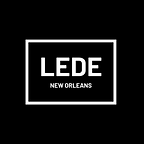For Black youth in New Orleans, music is a ‘safe haven’ to pursue mental health
New Orleans-based recording artists Kaylin “K3” Daigle and Isaiah “Sozi” Garner discuss their own creative process and the healing powers of R&B and hip-hop.
By Keva Peters Jr.
For artists Kaylin “K3” Daigle and Isaiah “Sozi” Garner, creating music isn’t just an artform. It’s also a therapeutic outlet, a way to process thoughts and emotions. That’s especially true amid the collective isolation and trauma of the COVID-19 pandemic.
“When I come to the studio it’s definitely a safe haven and a place where I can be most vulnerable and be myself and express myself,” K3 said.
Lede Fellow Keva Peters Jr. sat down with K3 and Sozi to talk about music as an outlet for the Black community to process trauma and pursue mental health, and the healing powers of hip-hop, a genre sometimes seen as glorifying street violence and trauma.
K3, originally from St. Rose, La., and now based in New Orleans and Atlanta, is pursuing a career as an R&B artist. Sozi, a Chicago native, credits his move to New Orleans a few years ago and the local music scene with helping him grow as a hip-hop artist. You can watch K3 and Sozi share their thoughts in their own words here.
This interview has been edited for length and clarity.
Is making music therapeutic for you?
Sozi: Everything I rap about, sing about, talk about, put out is my life. It’s real life. They say ‘No cap in the rap.’ There’s no cap in my rap. Everything I’ve been through. That’s why people gravitate towards my music.
What is the message you try to get across to your listeners?
K3: When I create my music for my listeners I try to create a safe haven for them so that they know it’s OK to be vulnerable. It’s OK to be yourself. To express yourself. Every single story is worthy to be told, no matter how big or small your trauma or your experience or your pain or your joy. There is a song worth every single emotion. So, it’s OK to be vulnerable. It’s OK to be open. It’s OK to tell your story because it’s worthy of being heard.
Sozi: Being authentic, being true to who you are. That’s really my message in my music. I talk a lot about the future in my rap, too. If people listen to my music I want to inspire them and really show them, think ahead. Be excited for the future. Set your goals.
How has New Orleans inspired you?
K3: New Orleans is a birth ground for so many different types of music. Jazz to zydeco to Southern soul to so many different forms of R&B. I take a lot of my lyricism and the way that I do my harmonies from artists like Mahalia Jackson. Louis Armstrong, the strut in his walk. All of that plays a pivotal part in my artistry overall. Every time I perform I’m paying homage to literally everybody who stepped before me. When you walk down Canal Street or Bourbon Street in New Orlean, you’ll hear the instruments and it will immediately give you a song in your head. New Orleans is a place where expression is born.
Sozi: I grew as an artist here. There are so many different sounds that bleed into the hip-hop community here. Jazz, even the bounce music here, brass band, big band music. All of that really just brought out of me that soul. There’s a lot of soul in this city.
Should artists think more about the positive and negative impact of their lyrics?
K3: A lot of artists, they express themselves through what they’ve seen, what they’ve been through and what they go through every single day. It’s not wrong for them to do that. That’s the lifestyle they live and it’s real and it’s worthy to be heard… It’s up to the listener to take that and be responsible with that information and not support certain things in their own lives. Or not apply it to their own lives.
Sozi: You have some people who take music real seriously. It could lead someone to do some things that they might necessarily not do if they hadn’t heard a song. That’s the negative effects of it, right? The positive effects is you’ve got music that talks people out of committing suicide, talks people out of tough times. That brings people joy. As artists I think that we should always be mindful of what our listeners, our consumers, our fans are consuming, and be mindful of what we say. We never know how that will affect someone negatively or positively.
Keva Peters Jr. is a filmmaker and writer based in New Orleans and a Lede New Orleans Fall 2020 Fellow. Peters is currently studying at Dillard University.
Lede New Orleans Coach Jennifer Larino contributed to this report.
